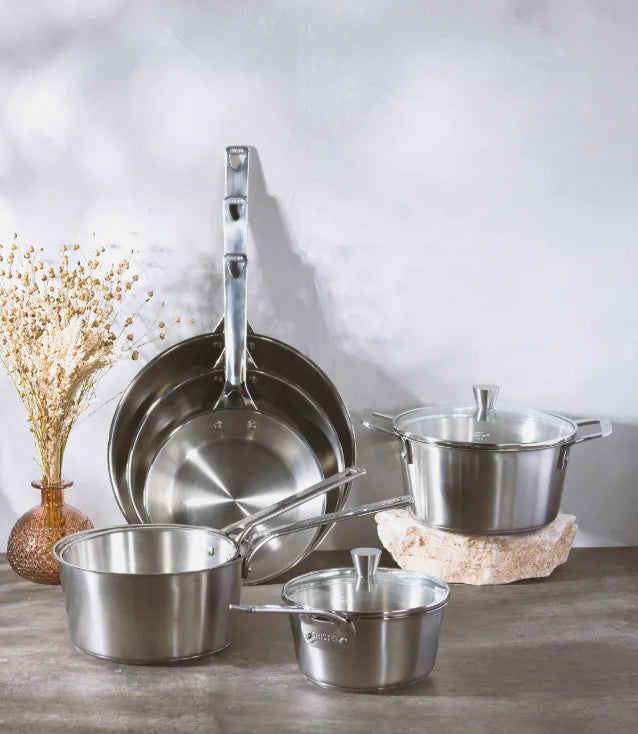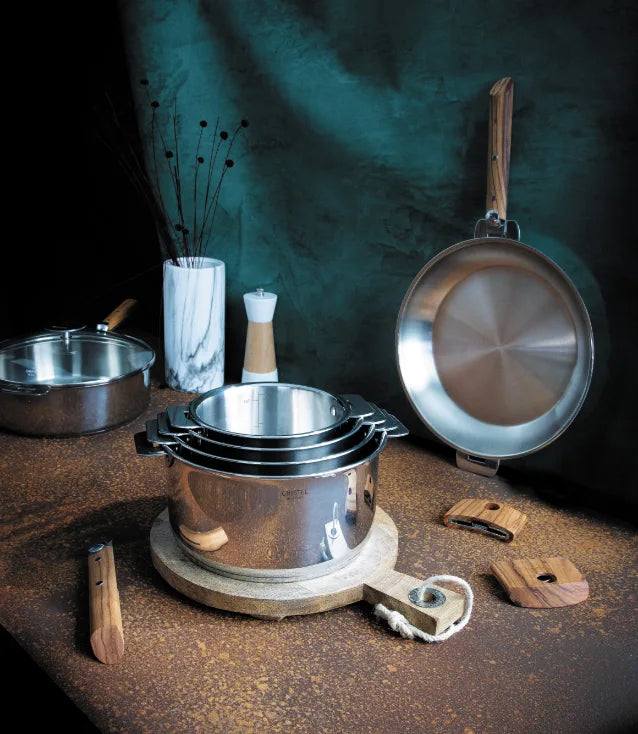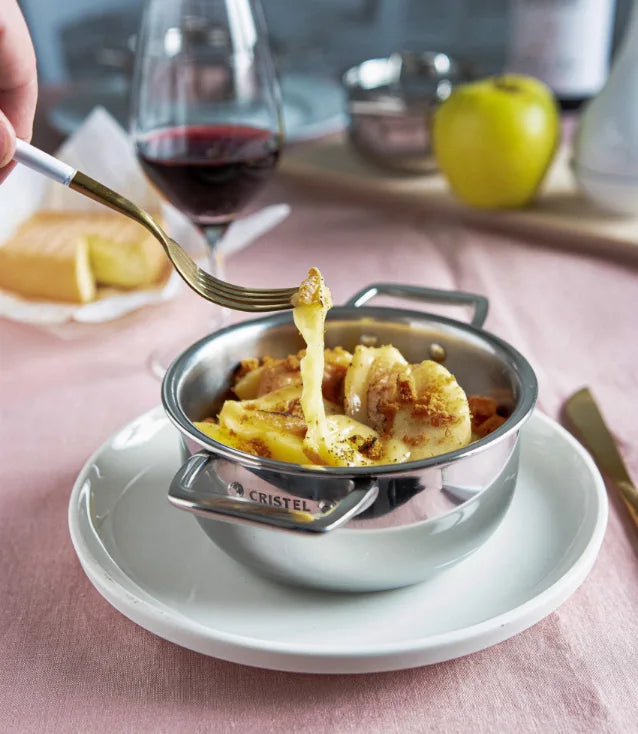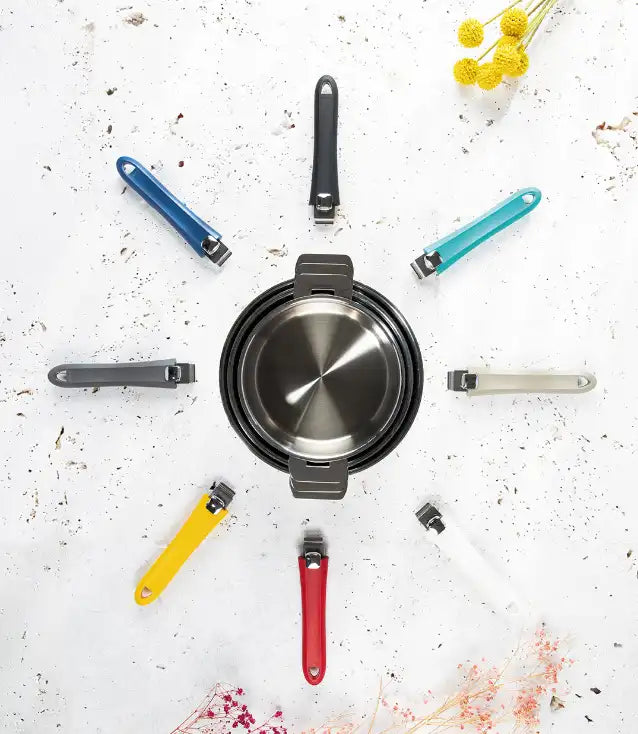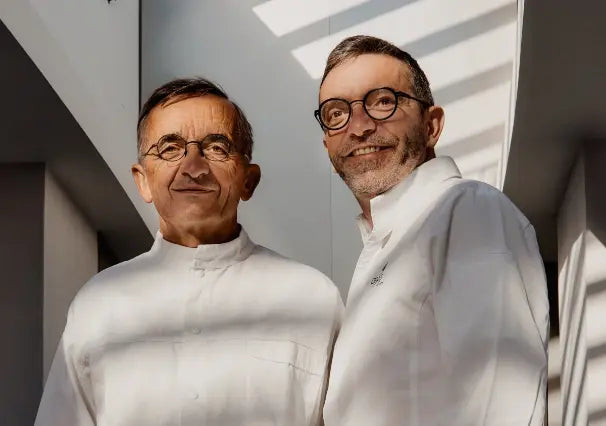Featured in Medium
Much like money, power is a requisite for achieving and creating, yet it appears more manageable when it isn’t concentrated solely in one person’s hands. This necessitates a greater focus on realizing a shared project rather than nurturing personal ambitions. Such an approach proves more beneficial for the company, provided that it’s underpinned by mutual respect and a commitment to hearing every voice. This encapsulates the fifth fundamental aspect.
As a part of our series about 5 Things You Need To Run A Highly Successful Family Business, I had the pleasure of interviewing Damien Dodane.
Born in Eastern France, Damien Dodane started his career as a professional actor, studying at the National School of Dramatic Art and the prestigious National Theater of Strasbourg. For more than two decades he was a professional thespian and director, before joining CRISTEL — a company which his parents revitalized. Damien’s primary role at CRISTEL starting in 2000, was dedicated to the expansion of the brand’s global presence, which he mastered, bringing partnerships across Europe. In 2020, Damien helped lead CRISTEL into markets across Japan and England, bringing the company’s global footprint to more than 40 countries worldwide, including the United States.
Damien’s passion is driven by his profound desire to unite individuals from diverse backgrounds with a variety of talents to unleash their creative potential and apply it to CRISTEL’s business model and product portfolio; this is at the essence of his ongoing journey with CRISTEL.
Thank you so much for joining us in this interview series! Before we dive in, our readers would love to learn a bit more about you. Can you tell us a story about what brought you to this specific career path?
I was born in Montbéliard, a quaint town nestled in the eastern region of France within Bourgogne Franche Comté. My journey began as an actor, commencing with my education at the National School of Dramatic Art at the prestigious National Theater of Strasbourg.
For two decades, I dedicated myself to the world of theater, wearing both the hats of a passionate actor and a director. My path led me to perform on renowned stages not only in Paris but also throughout France. This lifelong love affair with the dramatic arts ignited my enduring passion for adventure, exploration, and the sheer joy of collaborative creation.
During this period, my parents took an active role in the revitalization of CRISTEL, a company born from the determination of former industrial workers in our region. Their unwavering commitment to continue the company’s legacy after it faced bankruptcy was truly commendable. Initially, my mother lent her support to the workers, and my father soon followed suit, collaborating to devise sustainable solutions to resurrect CRISTEL. Together, they formulated and executed a high-end manufacturing strategy centered on excellence and innovation.
In the year 2000, I joined my parents in their dedicated efforts at CRISTEL, a decision prompted by the sudden loss of my younger sister. My primary focus during this period was the expansion of our global presence, which I diligently pursued until 2020. It was during this time that we established fruitful partnerships with both Japan and England. Presently, our CRISTEL products are distributed in over 40 countries worldwide, and in 2012, we took the significant step of establishing a subsidiary in the United States.
Transitioning from my role in export development, I now concentrate on two key areas at CRISTEL: product development and marketing communications.
Today, that same fervor I spoke of earlier, still fuels my purpose. I am driven by a profound desire to unite individuals from diverse backgrounds, weaving together their unique talents into a tapestry of shared narratives. In this pursuit, everyone has the opportunity to unleash their creative potential and offer their very best. This is the essence of my ongoing journey with CRISTEL!
Can you tell us a bit about your family business and your role in it?
CRISTEL epitomizes the essence of a family-driven business model. Founded by my parents, I now co-manage the company alongside my brother-in-law, Emmanuel Brugger, in addition to my eldest son and two nephews who joined our ranks a few years ago.
At the core of our organizational ethos lie family values of respect, dedication, and service. These principles form the bedrock of our interactions not only with our employees but also with our external partners. It’s this value-centric approach that sets CRISTEL apart, making us a truly distinctive entity within the culinary industry and a key contributor to our enduring success.
While we all have very different personalities and cultural backgrounds, we bring an array of complementary skills to the table, enriching our collective journey. Our differences contribute to the vibrant tapestry that is CRISTEL.
In my capacity, I bridge the gap between our dedicated employees and customers, all while preserving the fundamental values of CRISTEL. Throughout our entire team, be it our employees or the founding family, there exists a shared respect and profound alignment with these guiding principles.
Can you share the most interesting story that happened to you since you began this career?
The establishment of CRISTEL’s international branches has been marked by exciting journeys and the cultivation of special relationships. Yet, among all these endeavors, the creation of our U.S. subsidiary stands as one of the most thrilling chapters in my career.
Recognizing the enormity of the financial investments required to align with our ambitious goals in this market, I embarked on a persuasive mission within the company. I firmly believed that if we aspired to carve a remarkable success story in the United States and leave an impressionable mark on our customers, we had to take the initiative ourselves.
Today, the American market proudly stands as our second-largest market globally, trailing only behind France. While we remain tirelessly committed to furthering our visibility and recognition in the United States, we take immense pride in the acknowledgment we’ve received from culinary professionals. CRISTEL is now regarded as a paragon of quality in the culinary world, a testament to our unwavering dedication.
Can you share a story about the funniest mistake you made when you were first starting? Can you tell us what lesson you learned from that?
I distinctly recall my father’s request for me to oversee exports when I first joined CRISTEL in 2000. At that point, my grasp of the English language was quite basic, yet I found myself meeting with international clients at one of France’s most prominent conventions, Maison&Objet. In those early days, I eagerly responded with “yes” to every request and directive.
Navigating this unfamiliar terrain, I often experienced a sense of isolation and vulnerability. It was during this crucial period that I encountered one of London’s most significant buyers. He quickly grasped the language challenge I was facing, and while amused, he never once made me feel embarrassed about my linguistic limitations. Our friendship began during that convention, leading to a robust partnership that endured for years until his retirement.
In hindsight, I realize that I should have humbly sought the assistance of a translator back then. Such a move would have undoubtedly alleviated some of the delicate situations I encountered, and it took me years to fully mend some of those relationships.
What do you think makes your company stand out? Can you share a story?
What truly distinguishes CRISTEL in our industry today is not only the exceptional quality of our products but also the ethos that permeates our work.
CRISTEL has earned global acclaim as a standard-bearer for quality and craftsmanship. This reputation has been a cornerstone of our success, particularly in markets like Japan, where we occupy a special place. This achievement owes much to the efforts of our 30-year distributor, as well as our unwavering commitment to delivering products of unparalleled detail and excellence. Our relentless pursuit of innovation and improvement continues to drive our growth.
The cook-and-serve concept, conceived by my father in 1986, represents a genuine innovation in the daily use of our cookware. It enables cooking and serving in the same vessel, ensuring heat retention throughout a meal. Whether it’s starting a roast on the stovetop and finishing it in the oven with a frying pan or sauté pan, or efficiently storing a collection of cookware in a cupboard without the chaos of overcrowding — our high-performance, beautiful products bring daily pleasure to all those who love to cook!
However, our commitment extends beyond product excellence; it encompasses our love for our planet and our customers. In 2021, we proudly became a Mission company, a designation establishing our commitment to preserving our planet in our corporate charter. Our mission goes hand in hand with the well-being of all those who collaborate with us. We firmly believe that work can be a source of fulfillment, provided that the well-being of our employees remains at the forefront of our company’s philosophy. After all, a house (CRISTEL) is truly built on the well-being of the men and women who contribute to its success.
Are you working on any exciting new projects now? How do you think that will help people?
We are currently working on a new culinary collection inspired by the inaugural stamped saucepan series, born within our factory’s walls in 1826. Over the years, we’ve maintained a profound admiration for the design of that very saucepan.
Drawing inspiration from both its form and functionality, we embarked on a journey to craft a collection that pays homage to the original while leveraging our two-century legacy of efficiency and expertise. The result is a range of beautifully designed and highly functional products tailored for today’s modern kitchen. We foresee this new collection seamlessly integrating into both professional and home kitchens alike.
We presented the 1826 collection at the Masion&Objet show in Paris, in September (2023), and are working diligently to debut the collection in the U.S. at the beginning of 2024.
None of us are able to achieve success without some help along the way. Is there a particular person who you are grateful towards who helped get you to where you are? Can you share a story about that?
You’re absolutely right; at the core of our company’s DNA lies a deep appreciation for the collective efforts and unwavering commitment of everyone within our organization. I hold immense respect for the dedication exhibited by all the CRISTEL teams, whether they are involved in production or engaged in the marketing of our products. Witnessing this shared passion and our relentless drive to elevate our brand on the global stage fills me with immense pride.
However, what truly tugs at my heartstrings is the experience of returning to France after a well-deserved vacation. Walking through our workshops and offices and being greeted by the radiant smiles of our employees touches me profoundly and invigorates my own sense of purpose.
Nonetheless, I reserve a special admiration for Julien Djadane and Laurent Meurisse, entrusted with spearheading CRISTEL’s expansion in the U.S. While I maintain continuous communication with them, it’s undeniably challenging to be physically distant from our factory and teams. Their exceptional handling of the considerable responsibility associated with developing a French brand in such a pivotal market as the United States commands my deep respect and gratitude.
How have you used your success to bring goodness to the world?
As mentioned earlier, our commitment to making a positive impact extends beyond the products we create. It’s through the very essence of our work, marked by our attention to environmental sustainability and the quality of our partnerships, that we contribute most significantly to a better world. In fact, our guiding mantra, conceived alongside our company’s mission, is “let’s cook a better world together.”
Furthermore, we actively invest in organizations that not only reflect but also actively provide concrete solutions to enhance our relationship with the planet and with others. For instance, I hold the position of Vice President within the Origine France Garantie association, a collective of companies dedicated to nurturing business growth within France.
At both the national and local levels, I am deeply engaged with the Association of Living Heritage Companies and the Community of Companies Mission. We proudly welcome around 1,000 students annually, spanning various age groups and educational levels, offering mentorship to educate them about our operations and our values.
Lastly, CRISTEL consistently garners recognition at the national and regional levels for our unwavering commitments to social and societal causes.
Ok thank you for that. Let’s now pivot to the main parts of our interview. How do you define a family business? How is a family business different from a regular business?
To me, a family business represents an enterprise guided by the family’s primary objective: the continuation of its legacy, rather than opting for frequently bold, short-term financial decisions.
This perspective stands in contrast to the ethos of a startup, which often strives to rapidly develop an idea, even if it entails a speedy sale to the highest bidder. In contrast, a family business prioritizes generational succession and aligns itself with a long-term vision.
In your opinion or experience, what are the unique advantages that family owned businesses have?
Undoubtedly, the foundation of our success lies in the alignment of shared values, complementing skills, and a deep sense of respect. At CRISTEL, family members are evaluated just like any other employees, with our foremost consideration being what benefits the company most!
What are the unique drawbacks or blindspots that family owned businesses have?
What are some of the common mistakes you have seen family businesses make? What would you recommend to avoid those errors?
“Company-first” is our guiding principle when we consider bringing a family member onto our team. We evaluate their relevant experience and how it can be applied to enhance our company. We focus on what they can contribute to the organization rather than merely offering them a job. Furthermore, family members bear an additional responsibility: they must always prioritize the company’s interests over their personal ones.
In the realm of succession, trust plays a pivotal role. If trust is lacking or if intergenerational frustration runs high, our chances of success diminish. Therefore, we emphasize the importance of clearly defining the roles and responsibilities of each individual involved. It may require time and effort, but in the grand scheme of things, it’s an investment that ultimately pays dividends for the business.
What advice would you give to other CEOs or founders of family businesses to help their employees to thrive?
Transparency is a cornerstone of our approach when it comes to discussions about compensation and profit sharing with all our shareholders.
For instance, given our proximity to the Swiss border, our salary offerings naturally tend to be two to three times lower than those of our neighboring companies. However, we differentiate ourselves by placing a strong emphasis on the quality of work and providing unwavering support to our employees, making us an attractive choice for potential hires.
Moreover, we’ve made a deliberate decision not to allow salary variations exceeding six times the lowest salary within our company. We also ensure that every commitment and initiative is duly recognized and rewarded.
Lastly, our wealth distribution policy is rooted in a “family” ethos, where we reinvest three-quarters of the profits back into the company. We deliberately allocate minimal funds to shareholders to preserve and bolster our capacity for investment and future growth. This commitment to transparency underscores our unwavering dedication to prioritizing the company’s best interests and, consequently, those of all our employees over individual gains.
How do you define “Leadership”? Can you explain what you mean with a story or example?
To illustrate my perspective on this subject, I would say that an effective leader possesses keen perception, attentive listening, and a compassionate heart.
The eyes are indispensable because leadership hinges on vision. A leader must possess the ability to foresee, discern the evolving dynamics of the world, and determine how we can contribute positively to it.
The ears play an equally pivotal role, as a leader must attune themselves to the demands of the market and the concerns of all those working for and alongside them.
A compassionate heart completes the trifecta, as a good leader is someone adept at summoning the right kind of energy to rally and unite all the teams around them. It’s at the heart of everything, aligning individual and collective aspirations.
Here is our main question. What are the “5 Things You Need To Run A Highly Successful Family Business”?
Every story, every company, and every family journey is unique, so I can only share our experience at CRISTEL.
For us, the foremost principle is to distinguish between the needs of the company and the individuals who constitute our family. We regard a business as a communal asset rather than personal or family property. Hence, our approach is to consider a family member for recruitment only if they bring skills and qualities that align with the company’s requirements, not merely because of their familial ties. I vividly recall the surprise we all felt when my nephew Julien submitted his application for a sales position within our company.
Julien had excelled in his business studies, combining his academic pursuits with a role in one of France’s largest banks. His career trajectory was nothing short of remarkable, quickly ascending the ranks to oversee financial insurance at trading exchanges in the City of London. He had even been presented with an enticing job opportunity in New York.
However, when he expressed his interest in a sales representative position with us, we embarked on a deliberate and thorough evaluation process. This included three extensive interviews over three months to discern his readiness to make the significant sacrifice of a promising career and a substantial income to join our ranks. Today, Julien serves as our Commercial Director, and we couldn’t be happier with this exceptional addition to our team. His expertise in profitability and organizational acumen, coupled with his insightful 360° perspective within our organization, has enriched us immensely.
In the course of Julien’s recruitment journey, we made sure to invest ample time in delineating his role and articulating clear expectations. It’s essential to take the necessary time to painstakingly define the missions and objectives for any role. Moreover, we delved into the motivations behind his decision to embrace our company’s distinctive policies, which set us apart in our industry. This underscores the second crucial element, in my view, for the success of a family business.
In any family business, regardless of one’s last name, everyone plays a vital role, and it’s imperative to honor and uphold each individual’s responsibilities. This philosophy extends to all our employees, but it carries even greater weight for family members within the company.
The third pivotal element is the quality of the generational transfer. At present, my parents no longer hold executive roles within the company’s operations. In addition, they have thoughtfully passed on all their shares long ago, thus sparing us from the burden of inheritance costs. Nevertheless, they continue to serve a crucial role in the process of generational transition, particularly with regard to their grandchildren.
We actively engage them in all significant strategic decisions through participation in our Executive Committee meetings. Their perspectives and insights remain highly valued and influential in shaping the direction of our company.
In a family business, it’s important for all family members, including those not directly involved in the company, to have a deep understanding of it. This comprehension is essential for fostering alignment with the company’s success. To achieve this, we conduct family seminars every three years, providing a platform for every family member to share their perspectives on the company, and at times, express any challenges they might be experiencing as “accompanying persons.” These seminars also offer an opportunity to exchange diverse insights spanning various generations, with children actively participating.
To facilitate these seminars, we enlist the expertise of a coach or a specialist in family businesses. The seminars typically span two days and are held in a pleasant setting conducive to everyone’s comfort. This represents the fourth crucial element: recognizing that a family business is not only about the business itself but also about preserving the balance within the family.
Throughout CRISTEL’s history, my parents chose to share the power of management right from the outset. I believe this approach is pivotal, as it eschews the weighty and unbalancing burden of placing unchecked authority in a single individual’s hands.
Drawing from my experiences as an actor, I’ve had the privilege of delving into the works of Shakespeare, who masterfully illustrates how power can alter, harm souls, and subjugate humanity. In the context of our company, I currently share the role of General Management with my brother-in-law, Emmanuel. I greatly value this position and the conscious decision to distribute power in this manner.
Much like money, power is a requisite for achieving and creating, yet it appears more manageable when it isn’t concentrated solely in one person’s hands. This necessitates a greater focus on realizing a shared project rather than nurturing personal ambitions. Such an approach proves more beneficial for the company, provided that it’s underpinned by mutual respect and a commitment to hearing every voice. This encapsulates the fifth fundamental aspect.
We are very blessed that some of the biggest names in Business, VC funding, Sports, and Entertainment read this column. Is there a person in the world, or in the US with whom you would love to have a private breakfast or lunch with, and why? He or she might just see this if we tag them. 😊
I don’t subscribe to a cult of personality. I am equally intrigued by the projectionist behind the scenes as I am by the star on the screen. It’s a genuine sentiment. I take delight in meeting and learning from anyone who wishes to share their life experiences with me.
However, in response to your question, I would be particularly eager to meet Barack Obama. My aim would be to gain deeper insights into the formidable challenges he confronted and navigated during his tenure, as well as to explore how politics can continue to positively impact human lives. I would like to inquire, at the culmination of his journey, about his most formidable obstacles, profound discoveries, and his vision for the future of humanity.
You are a person of great influence. If you could inspire a movement that would bring the most amount of good to the most amount of people, what would that be? You never know what your idea can trigger. 😊
I believe you might be able to assist me in achieving a dream of mine. I aspire to find partners in the U.S. who can collaborate with us to implement a recycling program for our non-stick products, much like what we’ve successfully been doing in France since 1992. This endeavor would serve multiple purposes: it would contribute to environmental relief by conserving the raw materials needed for manufacturing our products and ensure lasting satisfaction for our customers.
Our stainless-steel products inherently possess a quality of indestructibility. We’ve invested significant effort in communication and education, advocating for the use of stainless steel in up to 90% of cooking scenarios. However, the paradox lies in the fact that over 90% of frying pans worldwide are equipped with non-stick coatings, which have a limited lifespan. As a result, people often discard these pans when they become damaged. Offering a solution that allows for the reapplication of the coating alone would be a monumental step forward, benefiting both customers and the environment alike.
